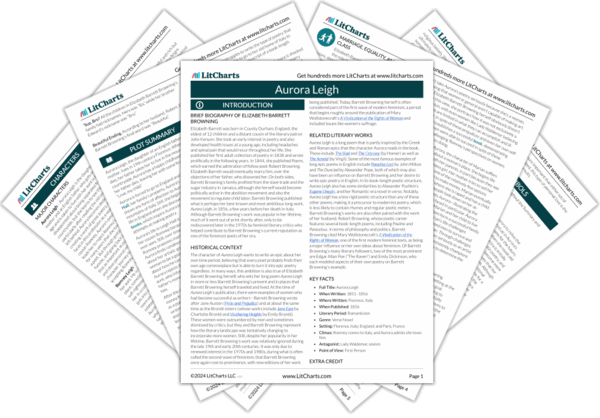Books represent a way for Aurora to relive the passionate feelings books stirred up in Aurora’s childhood as well as Aurora’s hopes and dreams for the future. Aurora first becomes obsessed with poetry when she reads old books that her father left behind. Although Aurora is initially drawn as a reader to books like Greek poetry, Latin poetry, and Shakespeare, she soon decides that she wants to become more than a reader and create her own poetry. She believes that her masterpiece will take the form of a book-length poem. Although to some people, like Aurora’s aunt, books are just functional objects meant to convey information or give instructions for a proper woman’s behavior, for Aurora, a book represents the potential to create something serious and important. Aurora sees the shorter pieces she publishes at the beginning of her career as simply a means to an end so that she can pay for her necessities and work on her book manuscript, which she believes will finally satisfy her artistic ambitions.
In spite of how much time and energy Aurora puts into crafting a book of poetry, when the book actually succeeds, it’s a bit of an anticlimax. Aurora initially only sold the manuscript to finance a trip to Italy, and even then, it didn’t make much money. When she later learns that her book is a success and that critics are talking about it, she is surprised and feels removed from the achievement, because she is away in Italy. Although the novel celebrates the artistic process and particularly the process of creating art as a woman, Aurora’s mixed feelings about the success of her book suggest that it isn’t possible for artistic ambition to fulfill the role that personal love plays in a person’s life. While Aurora’s book’s success plays a role in her happy ending, she also learns to form a close relationship with Marian and accept the romantic love of Romney. Books in Aurora Leigh represent passion and an antidote to restrained English life, but as Aurora learns by the end of the poem, books are not enough to fulfill the same role as loving, enduring personal relationships.
Books Quotes in Aurora Leigh
‘Better far,
Pursue a frivolous trade by serious means,
Than a sublime art frivolously.’
‘I go hence
To London, to the gathering-place of souls,
To live mine straight out, vocally, in books;
Harmoniously for others, if indeed
A woman’s soul, like man’s, be wide enough
To carry the whole octave (that’s to prove)
Or, if I fail, still, purely for myself.
Pray God be with me, Romney.’
When Romney Leigh and I had parted thus,
I took a chamber up three flights of stairs
Not far from being as steep as some larks climb,
And, in a certain house in Kensington,
Three years I lived and worked. Get leave to work
In this world,—’tis the best you get at all;
For God, in cursing, gives us better gifts
Than men in benediction. God says, ‘Sweat
For foreheads;’ men say ‘crowns;’ and so we are crowned
Shall I fail?
The Greeks said grandly in their tragic phrase,
‘Let no one be called happy till his death.’
To which I add,—Let no one till his death
Be called unhappy. Measure not the work
Until the day’s out and the labour done;
Then bring your gauges. If the day’s work’s scant,
Why, call it scant; affect no compromise;
And, in that we have nobly striven at least,
Deal with us nobly, women though we be,
And honour us with truth, if not with praise.
Ay, but every age
Appears to souls who live in it, (ask Carlyle)
Most unheroic. Ours, for instance, ours!
The thinkers scout it, and the poets abound
Who scorn to touch it with a finger-tip:
A pewter age,—mixed metal, silver-washed;
An age of scum, spooned off the richer past;
An age of patches for old gaberdines;
An age of mere transition, meaning nought,
Except that what succeeds must shame it quite,
If God please. That’s wrong thinking, to my mind,
And wrong thoughts make poor poems.
Every age,
Through being beheld too close, is ill-discerned
By those who have not lived past it.
‘Meantime your book
Is eloquent as if you were not dumb;
And common critics, ordinarily deaf
To such fine meanings, and, like deaf men, loth
To seem deaf, answering chance-wise, yes or no,
‘It must be,’ or ‘it must not,’ (most pronounced
When least convinced) pronounce for once aright:
You’d think they really heard,—and so they do ...
The burr of three or four who really hear
And praise your book aright: Fame’s smallest trump
Is a great ear-trumpet for the deaf as posts,
No other being effective. Fear not, friend;
We think, here, you have written a good book,
And you, a woman! It was in you—yes.’
‘That is consequent:
The poet looks beyond the book he has made,
Or else he had not made it. If a man
Could make a man, he’d henceforth be a god
In feeling what a little thing is man:
It is not my case. And this special book,
I did not make it, to make light of it:
It stands above my knowledge, draws me up;
’Tis high to me.’












